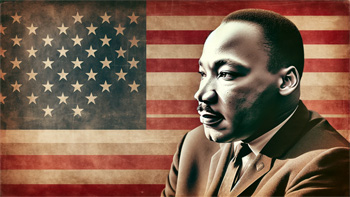 Martin Luther King Jr. Day
Martin Luther King Jr. Day


Martin Luther King Jr. Day, observed on the third Monday of January each year, stands as a significant date in the American calendar, honoring one of the most influential civil rights leaders in American history. Dr. Martin Luther King Jr., born on January 15, 1929, played a pivotal role in advancing civil rights through nonviolent civil disobedience inspired by his Christian beliefs and the peaceful teachings of Mahatma Gandhi. This national holiday not only commemorates Dr. King's birth but also celebrates his enduring legacy in striving for racial equality, justice, and peace.
The Journey to a National Holiday
The road to recognizing Martin Luther King Jr. Day as a national holiday was a long and challenging one. Following Dr. King's assassination on April 4, 1968, calls to commemorate his life and achievements began almost immediately. However, it was not until 1983 that President Ronald Reagan signed the holiday into law, and it was first observed on January 20, 1986. The day serves as a poignant reminder of the struggle for civil rights and the ongoing efforts required to achieve true equality and justice for all.
Celebrations and Observances
Across the United States, Martin Luther King Jr. Day is marked by various events and activities that reflect the principles and values that Dr. King espoused. Schools and communities organize educational programs, workshops, and rallies focusing on the history of the civil rights movement and its contemporary significance. Parades, concerts, and service projects are also common, as the day is not only a time for reflection but also for action, echoing Dr. King's call for community service and involvement in societal change.
Dr. King's Impact on Civil Rights and Beyond
Dr. Martin Luther King Jr.'s impact extends far beyond his role in the civil rights movement. He is celebrated for his powerful advocacy of nonviolent protest, his stirring oratory, and his tireless commitment to the cause of equality. His "I Have a Dream" speech, delivered during the 1963 March on Washington for Jobs and Freedom, remains one of the most iconic speeches in American history, encapsulating his vision of a society free from discrimination and segregation.
Legacy and Modern Relevance
The legacy of Martin Luther King Jr. continues to resonate in modern America and around the world. His message of equality, tolerance, and nonviolent protest remains relevant in contemporary struggles for social justice. As society continues to grapple with issues of racial inequality, police brutality, and systemic discrimination, Dr. King's teachings provide a beacon of hope and a guide for peaceful and effective activism.
A Day of Reflection and Action
In conclusion, Martin Luther King Jr. Day is much more than a commemoration of a great leader's birth; it is a day of national reflection and a call to action. It urges individuals to remember the past struggles for civil rights, recognize the present challenges, and work towards a future that aligns with the ideals Dr. King so passionately advocated for. As we observe this day, let us recommit to the principles of justice, equality, and peaceful change, continuing the work that Dr. King started.
Dr. Martin Luther King Jr.'s famous quote: Darkness cannot drive out darkness; only light can do that. Hate cannot drive out hate; only love can do that.